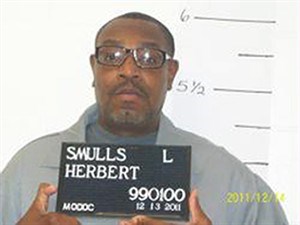
FILE - In this Dec. 13, 2011 file photo released by the Missouri Department of Corrections is death-row inmate Herbert Smulls who is scheduled to die by injection one minute after midnight Wednesday, Jan. 29, 2014 for killing St. Louis County jeweler Stephen Honickman in 1991. The U.S. Supreme Court has granted a stay of execution for Missouri death row inmate Herbert Smulls, Tuesday, Jan. 28, 2014. Justice Samuel Alito signed the order that was sent out Tuesday night after President Barack Obama's State of the Union speech. (AP Photo/Missouri Department of Corrections)
January 28, 2014 - 10:42 PM
ST. LOUIS - The U.S. Supreme Court is expected to rule Wednesday on two petitions regarding Missouri death row inmate Herbert Smulls, The Missouri Attorney General's office says.
Smulls' execution was temporarily stayed late Tuesday night with an order from the high court signed by Justice Samuel Alito. It was sent about two-and-a-half hours before Smulls was scheduled to die at 12:01 a.m. Wednesday.
Missouri statutes allow executions to occur at any time of the day they are scheduled — that's why the state always sets the execution time for a minute after midnight, in case there are court delays. If the U.S. Supreme Court ultimately decides in favour of the state, the execution could occur later Wednesday.
Smulls' lawyer, Cheryl Pilate, had made last-minute pleas Tuesday to spare his life, focusing on the state's refusal to disclose from which compounding pharmacy they obtain the lethal-injection drug, pentobarbital. But Missouri has argued the compounding pharmacy is part of the execution team — and therefore its name cannot be released to the public.
Smulls, 56, was convicted and sentenced to death for killing a St. Louis County jeweler and badly injuring his wife during a 1991 robbery.
Pilate says the stay is temporary while the high court reviews the case, but she is hopeful the stay will become permanent.
"We're happy to get the stay and we're glad the court is reviewing it," she said.
Eric Slusher, a spokesman for Missouri Attorney General Chris Koster, said the high court is expected to rule on the two pending petitions Wednesday.
St. Louis County prosecutor Bob McCulloch said talk about the drug is a smoke screen aimed at sparing the life of a cold-blooded killer. He noted that several courts have already ruled against Smulls, including U.S. District Court in Kansas City and the 8th U.S. Circuit Court of Appeals. Gov. Jay Nixon denied clemency Tuesday evening.
Pilate contends that the state's secrecy makes it impossible to know whether the drug could cause pain and suffering during the execution process.
Smulls had already served prison time for robbery when, on July 27, 1991, he went to F&M Crown Jewels in Chesterfield and told the owners, Stephen and Florence Honickman, that he wanted to buy a diamond for his fiancee. He took 15-year-old Norman Brown with him.
Once in the shop, Smulls began shooting. The robbers took rings and watches, including those that Florence Honickman was wearing.
She was shot in the side and the arm, and feigned death while lying in a pool of her own blood but survived. Her 51-year-old husband died.
Police stopped Smulls 15 minutes later, and they found stolen jewelry and weapons in his car. Florence Honickman identified the assailants. Brown was convicted in 1993 of first-degree murder and other charges, and sentenced to life without parole. Smulls got the death penalty.
Missouri had used a three-drug execution process since 1989, until the drug makers stopped selling those drugs for executions. Missouri eventually switched late last year to pentobarbital. Pentobarbital was used to execute two Missouri inmates late last year, and neither showed visible signs of distress.
Compounding pharmacies custom-mix drugs for clients and are not subject to oversight by the U.S. Food and Drug Administration, though they are regulated by states.
On Tuesday, Pilate said that previous testimony from a prison official indicates the state stores the drug at room temperatures, which could taint the drug and potentially cause it to lose its effectiveness.
Pilate also said she and her defence team used information obtained through open records requests and publicly available documents to determine that the compounding pharmacy is The Apothecary Shoppe, based in Tulsa, Okla. In a statement, The Apothecary Shoppe would neither confirm nor deny that it makes the Missouri drug.
___
Associated Press writers Justin Juozapavicius in Tulsa, Okla., and Chris Blank in Jefferson City, Missouri, contributed to this report.
News from © The Associated Press, 2014